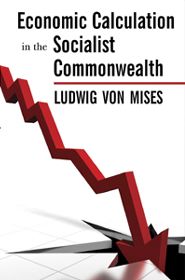This is an old revision of this page, as edited by BasedMises (talk | contribs) at 16:22, 18 March 2021. The present address (URL) is a permanent link to this revision, which may differ significantly from the current revision.
Revision as of 16:22, 18 March 2021 by BasedMises (talk | contribs)(diff) ← Previous revision | Latest revision (diff) | Newer revision → (diff)
"Economic Calculation in the Socialist Commonwealth" is an article by Austrian School economist Ludwig von Mises. Its critique against economic calculation in a planned economy triggered the decades-long economic calculation debate.
The article was first published 1920 in German under the title Die Wirtschaftsrechnung im sozialistischen Gemeinwesen and based on a lecture Mises gave in 1919 as a response to a book by Otto Neurath, arguing for the feasibility of central planning. Two years later, the essay was incorporated into Mises's book Socialism: An Economic and Sociological Analysis.
The Mises Institute has a free online copy available.
Synopsis
Mises laid out that economic calculation requires 2 fundamental things
- A medium of exchange (i.e money)
- Markets
According to Mises, although it is possible to perform economic calculation in a proficient manner without these two requirements present, very few circumstances exist. These circumstances include economic calculation within a household.
To him, cost-benefit analysis is not hard to do on a personal scale. It is not hard to pick between a certain amount of wine and a certain amount of oil. However, because marginal utility is not homogeneous and universal, people will have different preferences. For example, a teetotaler may prefer oil to wine, whereas an alcoholic may prefer wine. Thus the central planner or bureaucrat will have trouble distributing resources as prices cannot be set without markets as prices reflect the supply and demand of goods, labour and resources. Buying and selling consumer goods within a socialist state will simply be internal transfers of goods and not "objects of exchange", which sets the price mechanism out of order.
Mises thought that Economic Calculation is only possible (outside of extremely limited circumstances) by information provided by market prices, which reflects the changes of individual subjective values. Bureaucratic, centrally planned methods of resource allocation are inherently irrational and do not allocate resources in the most efficient method, which means that economic calculation in a socialist commonwealth is impossible. Because of the economist's idea that cost-benefit analysis is imperative and crucial, the socialist economy is also impossible.
Criticisms
Marxist computer programmer Paul Cockshott argues that economic calculation is possible within a socialist state as long as computational devices are used. In "Towards a New Socialism's "Information and Economics: A Critique of Hayek" and "Against Mises", he argues that central planning is simplified by the use of computers, and that it economic calculation grants central planning the ability to sustain itself.
See also
References
- Hacohen, Malachi Haim (2002). Karl Popper – The Formative Years, 1902-1945: Politics and Philosophy in Interwar Vienna (reprint ed.). Cambridge University Press. p. 477. ISBN 978-0-521-89055-7.
- ^ "Economic Calculation in the Socialist Commonwealth". Mises Institute. Retrieved 27 April 2010.
- ^ Huerta de Soto, Jesús (2010). Socialism, Economic Calculation and Entrepreneurship. Edward Elgar Publishing. pp. 103–104. ISBN 978-1-84980-065-5.
- Cockshott, Paul (1993). Towards a New Socialism. Coronet Books.